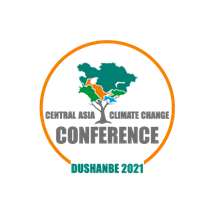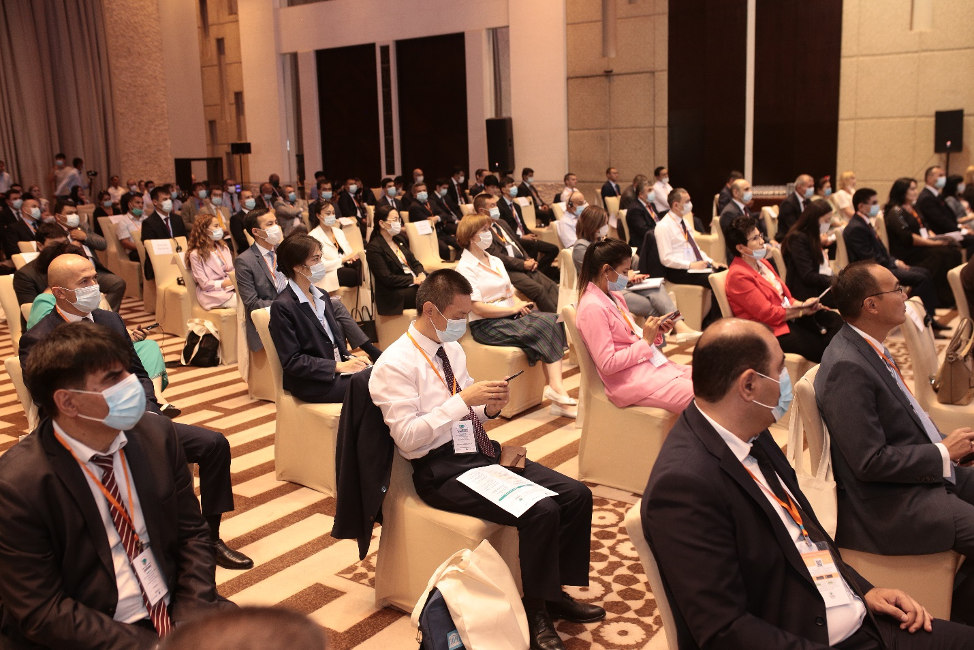
On July 26-27, 2021, the Fourth Central Asia Climate Change Conference (CACCC-2021) "Regional Cooperation for Climate-Resilient Future" is held in Dushanbe (Tajikistan). The event is organized as a mix of in-person and online meetings. The conference is organized within the framework of the "Climate Adaptation and Mitigation Program for Aral Sea Basin" (CAMP4ASB) project; it is also a continuation of the World Bank's initiative on climate change information exchange in Central Asia, which was launched in 2013. The regional component CAMP4ASB is implemented by the Regional Environmental Centre for Central Asia (CAREC) and coordinated by the Executive Committee of the International Fund for Saving the Aral Sea (EC IFAS).\
At the first day of CACCC-2021 the opening ceremony and the thematic sessions on climate policy and Role of civil society and climate financing were conducted. The opening ceremony was moderated by Mr Sino Tohirzoda, a representative of Tajikistan, and at this session presentations were made by:
Mr Sheralizoda Bakhodur, Chairman of the Committee for Environmental Protection of the Republic of Tajikistan;
H.E. Mr David Moran, COP26 Regional Ambassador for Europe, Central Asia, Turkey and Iran;
Mr John Bryant “JB” Collier, Senior Environmental Specialist, World Bank;
Mr Peter Young, USAID Central Asia Deputy Regional Mission Director
Mr Viorel Gutu, Director, FAO Subregional Office for Central Asia in Ankara (Turkey)
Mr Sulton Rakhimzoda, Chairman of the Executive Committee of the International Fund for Saving the Aral Sea;
Mr Zafar Makhmudov, Executive Director of the Regional Environmental Centre for Central Asia.
Tajikistan as the hosting country defined the discussion and determination of ways for the regional cooperation on climate mitigation and adaptation and to combat with the global warming as the main objective of the conference. Mr Bakhodur Sheralizoda stressed that the understanding in Central Asia as well as in the entire world is growing that the achievement of climate resilience is possible only by finding joint solutions and by taking into account of key transboundary interests of the region. “Each country of the region is interested and should take joint efforts to solve the existing environmental problems of Central Asia”, - underscored the Chairman of the of the Committee for Environmental Protection of the Republic of Tajikistan.
The important focus of the opening session was on the necessity of speeding up climate change solutions and that the global pandemic is not the key challenge for the humanity. Mr Zafar Makhmudov said that the discussion of updated and more ambitious nationally determined contributions to the Paris agreement is the main task for the participants of CACCC-2021. In his speech he stressed that this is “a unique chance” – “to determine new opportunities and partnerships for the achievement of climate-resilient future in the period of post-pandemic”.
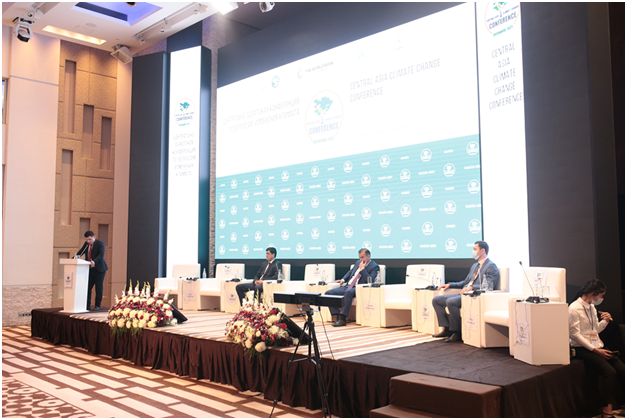
The thematic session on climate policy and role of civil society became a logical continuation of the regional dialogue on more ambitious nationally determined contributions. It was moderated by another representative of Tajikistan – Firuz Saidov, national expert on climate change. The necessity of more ambitious goals, associated challenges as well as some progress at the international level were mentioned in the presentations by Ms Olga Pilifosova, Adaptation Programme Manager of the UNFCCC Secretariat, Mr Philipp Saprykin, Deputy Head of the Regional Centre of the UNRCCA Turkmenistan, Ms Natalia Olofinskaya, Regional Technical Specialist of the UNDP Istanbul Regional Hub and Mr Vladimir Kendrovski, representative of the WHO European Centre for Environment and Health. Each of the speakers touched upon various aspects of this process. They concern such issues as international climate negotiations and climate finance by developed countries, solution of international water problems and diplomacy, sustainable development and technical assistance with the updating national contributions, climate change vulnerability and human health of people and communities.
Representatives of the public authorities of Central Asia countries told the participants on how they do update the nationally determined contributions to the Paris agreement and take action on their achievement. It concerned the establishment of the State Committee on Ecology and Climate in Kyrgyzstan, adoption of the new climate change adaptation legislation in Kazakhstan, activities on early warning and local communities in Tajikistan, massive planting trees in Turkmenistan and development of energy efficiency and renewables in Uzbekistan. In this part of the discussion representatives of the Ministry of Ecology, Geology and Natural Resources of Kazakhstan, State Committee on Ecology and Climate of Kyrgyzstan, Ministry of Foreign Affairs of Turkmenistan, Tajikhydromet and Uzhydromet took a part.
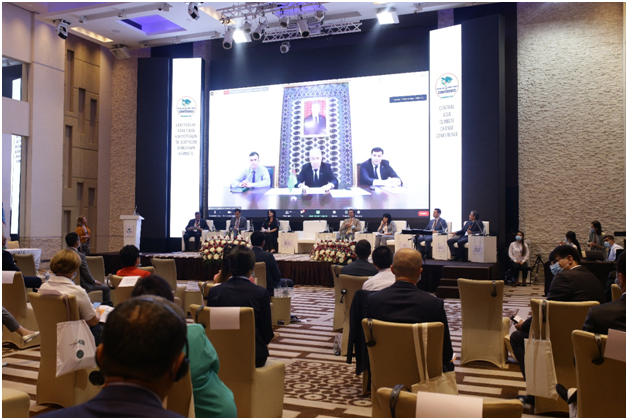
The dialogue of the public authorities was followed by the dialogue by representatives of the civil society, in which participated Quentin Moreau, Regional Director for Central Asia of the NGO "GERES" (France), Olha Boyko, Coordinator of the Climate Action Network (CAN) EECCA, Saidrasul Sanginov, Deputy Chairman of the Executive Committee of the Ecological Party of Uzbekistan, member of the Regional Network of Civil Society Organizations on Climate Change, Bulat Yessekin, Coordinator of the Regional Platform on Water and Environment of Central Asia, Zafar Makhmudov, CAREC Executive Director. During their interventions it was made clear that the key role of civil society organizations is in closing climate change information gaps, ensuring transparency of governmental climate goals and action and support of climate adaptation at the level of local communities.
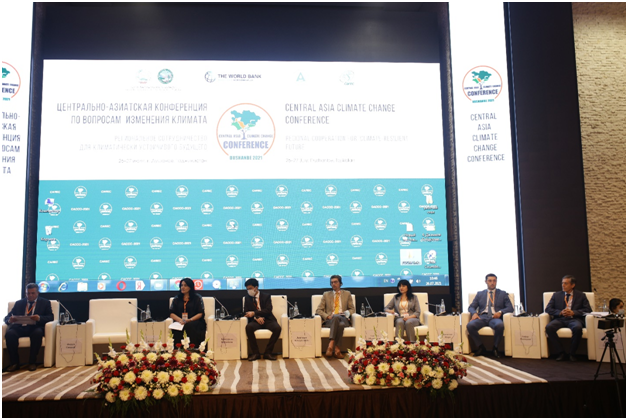
Climate financing as the important tool for the implementation of climate tasks was the second thematic focus of CACCC-2021. The discussion on this topic was conducted in three parts: roundtable; report on concrete activities; the point of view of Central Asia. Allessandra Fidanza, international consultant, assisted as the moderator of this thematic discussion. The following experts participated in the first part of the discussion on climate financing: Paola Agostini, Lead Environmental Economist, World Bank; Guy Bonvin, Swiss Special Envoy for Water in Central Asia; Torsten Brezina, Cluster Coordinator, GIZ; Vincent Duijnhouwer, EBRD representative; Henk Ovink, Dutch special envoy to the UN and the First Water Ambassador of the Netherlands; Henning Wuester, Director of the Initiative for Climate Action Transparency (ICAT); Kazuhiro Yoshida, ADB representative; Benoît Mauduit, representative of the French Development Agency (AFD). Their presentations showed a wide spectrum of climate support provided in Central Asian countries by international organizations, international financial institutions and foreign development agencies. This provides opportunities not only for the implementation of various projects on climate change mitigation and adaptation but also to develop the regional cooperation of Central Asian countries on climate change issues.
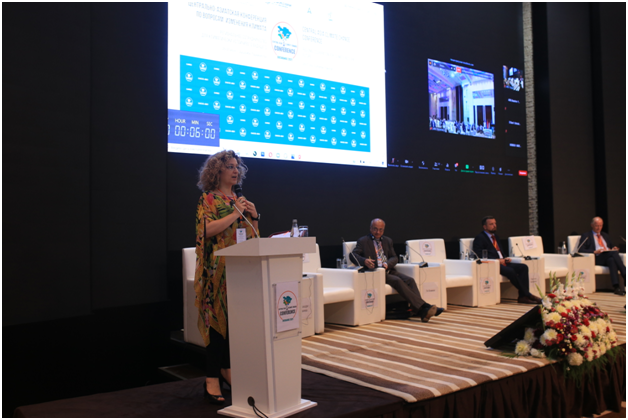
The following international and national experts took a part in the second part of the thematic session on climate financing: Daler Domullodzhanov, National Technical Officer, FAO; Tshewang Dorji, Climate Change Specialist, GEF; Weijen Leow, World Bank expert; Antoine Nunes, Head of the EPR Programme, UNECE, Richard Volk, representative of the WAVE project, USAID; Daniyar Yerenchinov, Chairman of the Board of Directors, International Green Technologies and investments Projects Center (IGTIPC). It provided to review the climate finance in Central Asia by the Global Environmental Facility, World Bank, USAID, to discuss the opportunities and challenges for private investments in climate change action, determination of relevant green and climate projects as well as to consider the level of climate finance in certain countries of the region.
The thematic discussion on climate financing was continued by 4 representatives of public authorities and organizations of Central Asian countries – Mr Abdyldaev, Director of the Climate Finance Center, State Committee on Ecology and Climate of the Kyrgyz Republic, Ms Saidova, Ministry of Finance of the Republic of Tajikistan, Mr. Chakiev, Ministry of Economy and Finance of Turkmenistan and Ms Natalya Agaltseva, Uzhydromet.
The first day of CACCC-2021 was completed by the signing MoUs between the Regional Environmental Centre for Central Asia and a number of environmental organizations from Kazakhstan and Kyrgyzstan.
